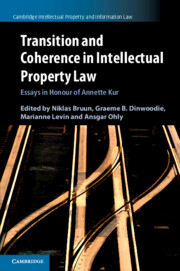Book contents
- Transition and Coherence in Intellectual Property Law
- Cambridge Intellectual Property and Information Law
- Transition and Coherence in Intellectual Property Law
- Copyright page
- Contents
- Preface
- Greetings to Annette Kur from the Second Floor
- Annette Kur: Toward Understanding
- Part I Transition
- Part II Coherence
- A Intellectual “Property” and its Limits
- B IP Overlaps
- C (Un-)fairness
- 34 Geographical Indications as Intellectual Property Rights – Beyond Transition and Coherence
- 35 Presence or Absence of Coherence in Trade Identity Protection in the European Union
- 36 Virtue Ethics and Private Law – A Sketch
- 37 Closing the Gap: How EU Law Constrains National Rules Against Imitation
- 38 European Union Law and Slavish Imitation: An Update in Honour of Annette Kur
- 39 The German Misappropriation Origins of Trademark Antidilution Doctrine: A Translation of the 1924 Odol Opinion of the Elberfeld Landgericht
- 40 The Relationship Between the Unfair Competition Regime and IP Law
- 41 Comparative Advertising: Does Trade Mark Law Over- or Under-Protect the Average Consumer? A Couple of Recent Examples of Asian Jurisdictions Going their Own Way
- Conclusion
- Cambridge Intellectual Property and Information Law
35 - Presence or Absence of Coherence in Trade Identity Protection in the European Union
from C - (Un-)fairness
Published online by Cambridge University Press: 29 December 2020
- Transition and Coherence in Intellectual Property Law
- Cambridge Intellectual Property and Information Law
- Transition and Coherence in Intellectual Property Law
- Copyright page
- Contents
- Preface
- Greetings to Annette Kur from the Second Floor
- Annette Kur: Toward Understanding
- Part I Transition
- Part II Coherence
- A Intellectual “Property” and its Limits
- B IP Overlaps
- C (Un-)fairness
- 34 Geographical Indications as Intellectual Property Rights – Beyond Transition and Coherence
- 35 Presence or Absence of Coherence in Trade Identity Protection in the European Union
- 36 Virtue Ethics and Private Law – A Sketch
- 37 Closing the Gap: How EU Law Constrains National Rules Against Imitation
- 38 European Union Law and Slavish Imitation: An Update in Honour of Annette Kur
- 39 The German Misappropriation Origins of Trademark Antidilution Doctrine: A Translation of the 1924 Odol Opinion of the Elberfeld Landgericht
- 40 The Relationship Between the Unfair Competition Regime and IP Law
- 41 Comparative Advertising: Does Trade Mark Law Over- or Under-Protect the Average Consumer? A Couple of Recent Examples of Asian Jurisdictions Going their Own Way
- Conclusion
- Cambridge Intellectual Property and Information Law
Summary
Annette Kur has dominated like few others the academic approach not only to trade mark law but also to design law and related matters of protection of intellectual property rights, branching broadly into private international law and international procedural law, both as a prolific author and as teacher, far beyond her German origin. The comparative law approach, which was and is the hallmark of the Munich Max Planck Institute for Intellectual Property and Competition Law, now named Institute for Innovation and Competition – her intellectual “Heimat”, has always moderated the search for the best answer. When recognizing a variety of possible solutions, we should be modest in propagating our own solutions. As an example for this I should like to refer to the famous Study on the Overall Functioning of the European Trade Mark System commissioned by the European Commission and published by the Max Planck Institute in 2013 – Annette Kur was one of the principal authors of this Study, which is an example of her skill in blending profound academic analysis and expertise with wisdom in proposing legislative solutions. My contribution to this Festschrift is meant as a small tribute to what Annette Kur represents today at the summit of intellectual property law.
- Type
- Chapter
- Information
- Transition and Coherence in Intellectual Property LawEssays in Honour of Annette Kur, pp. 416 - 427Publisher: Cambridge University PressPrint publication year: 2021



